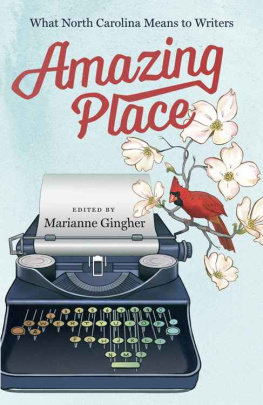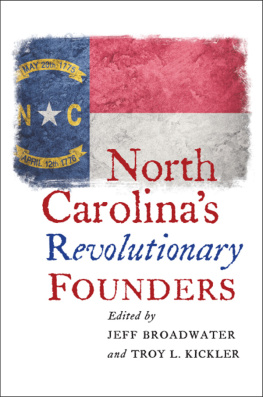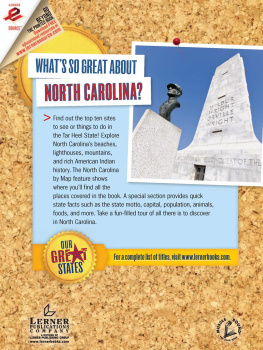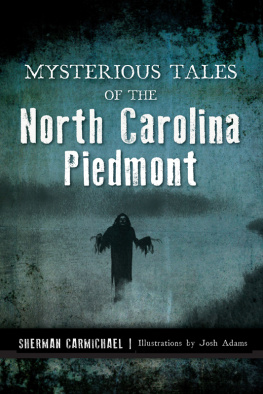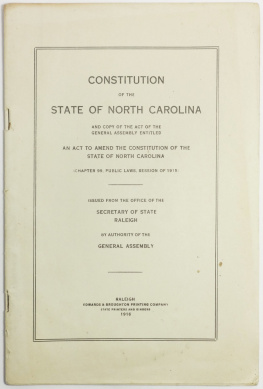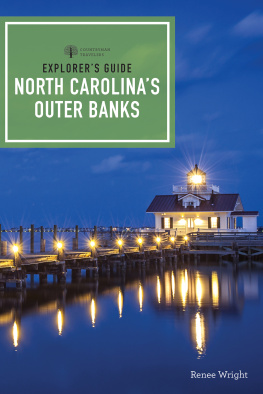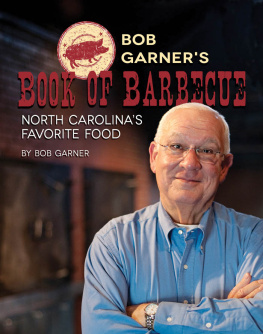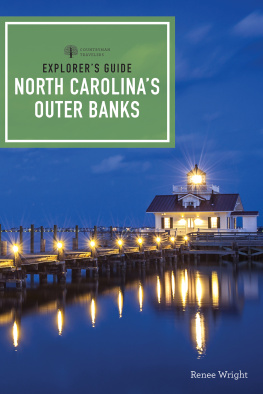This book was actually the brainchild of Zach Read, a former editor at UNC Press, and I am grateful to him for his early enthusiasm and persistence in seeing the project launched. I hope hell be pleased with the end result. A plenitude of gratitude goes to my editor, Mark Simpson-Vos, whose patient steerage, sharp insights, and suggestions improved the manuscript in every way; to Lucas Church, Marks assistant, for keeping me on task with the nit-picky stuff; and to Jay Mazzocchi for meticulous, eagle-eyed copyediting. Thanks to everyone at the press for making my job easier and for supporting the publication of this wonderful and unique little book. And now a drumroll, if you please, because Amazing Place is a first for UNC Press: an anthology of never-before-published personal narratives by contemporary fiction and imaginative nonfiction writers. It will assume its proper niche on the shelf beside anthologies of contemporary poetry and fiction that the press has published in the past. Kudos to UNC Press for its vision.
Thanks to all the great people I work with at UNCChapel Hill, most importantly to my colleagues in the Department of English and Comparative Literature and in the Creative Writing Program. Special thanks to Anita Braxton, Susan Irons, Bland Simpson, Beverly Taylor, and Daniel Wallace for always having my back, and to my new colleague, Stephanie Elizondo Griest, who so gamely undertook the assignment to write a piece for this book even though shed only been a North Carolinian for about five minutes. Gratitude to Lee Smith, too, for going the extra milealways.
I am indebted to the Bowman and Gordon Gray Professorship Program for the grant I received that enabled me to spend time collecting and assembling the contents of this book.
Last, but by no means least, mighty thanks and thunderous cheers to the writers who signed on and delivered such, well amazing narratives. Their generosity of time and spirit, their enthusiasm, and their writing means the world to me.
Introduction
Place is where we put our roots, wherever birth, chance, fate, or our traveling shoes set us down, Eudora Welty wrote.
Ive lived in North Carolina since I was three years old. My father was born and raised here, as were his Scottish forebears. I was educated here, and I continue to work here. My writing life began here, and I am fairly certain it will end here. I would be hard-pressed to deny that living in North Carolina has shaped me as a writer. The essence of place is family, friends, community, heritage, culture, weather, and landscape in all its sensory glory (or squalor), steeping in a particular containment of time. Any writer you ask will tell you that place insists upon particulars: politics, religion, race, economy, manners, jokes, fashion, music, recipes, wood smoke, the taste of sea salt, an unpaved road, a wrecking ball, a church, a swamp, an alleyway, a tobacco field, the syrupy warble of a wren, the sound of somebody humming while washing dishes at the kitchen sink, the stink of a paper mill, the chill of a waiting room where anything might happen and usually does, the cadences of language and variances of human attitude, glimpsed up-close or slant. All the things around us, physical and atmospheric, obvious or implied, combine to center, guide, and sharpen a writers sensibilities, leaving impressions that endure.
Which is probably why, when I take myself to the most generic and mundane of placesa car dealership in GreensboroI find an inkling of story. I am not even looking for a story, but closely observed, any place can become a particular place and will attract stories.
Stories begin in a where. Theres got to be a where before somebody shows up and things begin to happen. Once a character arrives on the scene, shes bound by the laws of human nature to have some kind of reaction to her surroundings. Place is a medium, after all, a kind of situational petri dish that cultures behavior, good, bad, or indifferent. The nature of place is that it insists upon being reckoned with by everyone, not just writers.
At the car dealership, its 7:30 A.M.; theres a complimentary pot of superheated coffee-turned-to-sludge, the sort of beverage that threatens to melt any cup you pour it into. Florescent lighting bleaches the air. I cant tolerate the inane blather of TV ads in the lounge area. The mechanic has told me the inspection might take an hour and a half. Ive brought some reading, and so I amble around the glacial showrooms stocked with cars so pristine, so quietly muscular, they look embalmed, mosey past a warren of mostly empty offices, until I locate a dark and distant room where I trespass. Theres a white board scribbled with statistics. One out of four demos will buy, reads one note. Ah! Secret information! This is a room where car salesmen are trained. I sit down at the seminar table, settle in, flip open my book. Then, a woman pokes her head into the room. She, too, is seeking asylum from the infernal TV. Mind if I join you? she asks in a honey-baked down-home accent. I need some place I can read my Bible in peace.
She lugs in a Bible as big as a cinderblock and sits across from me. Her lips move silently as her fingers glide down a page. The incongruity of a woman devotedly reading her Bible in proximity to the sleek, glossy, secular showroom of a car dealership resonates. Im suddenly wide awake and loving that Im in this place, where sharky commerce and somebodys faith so blithely coexist. Would I be so attuned to the dynamics of incongruity if I lived elsewhere? If many of my elders had not been drawling North Carolina porch-sitters who made mountains out of molehills and thrived on the odd detail? Maybe. What I do know is that my upbringing in such a story-centric milieu accelerates my delight in such gleanings, has honed my appetite for, my appreciation and expectation of them. I have learned to keep vigil for stories. A place might seem as ordinary as a still pond waiting for ripples, but if you keep watching and listening like a patient fisherman, the ripples will come. A fish is going to leap out of the wateror something even more extraordinary. Even the hucksterish, generic chic of a car dealership can glitter with more than chrome.

